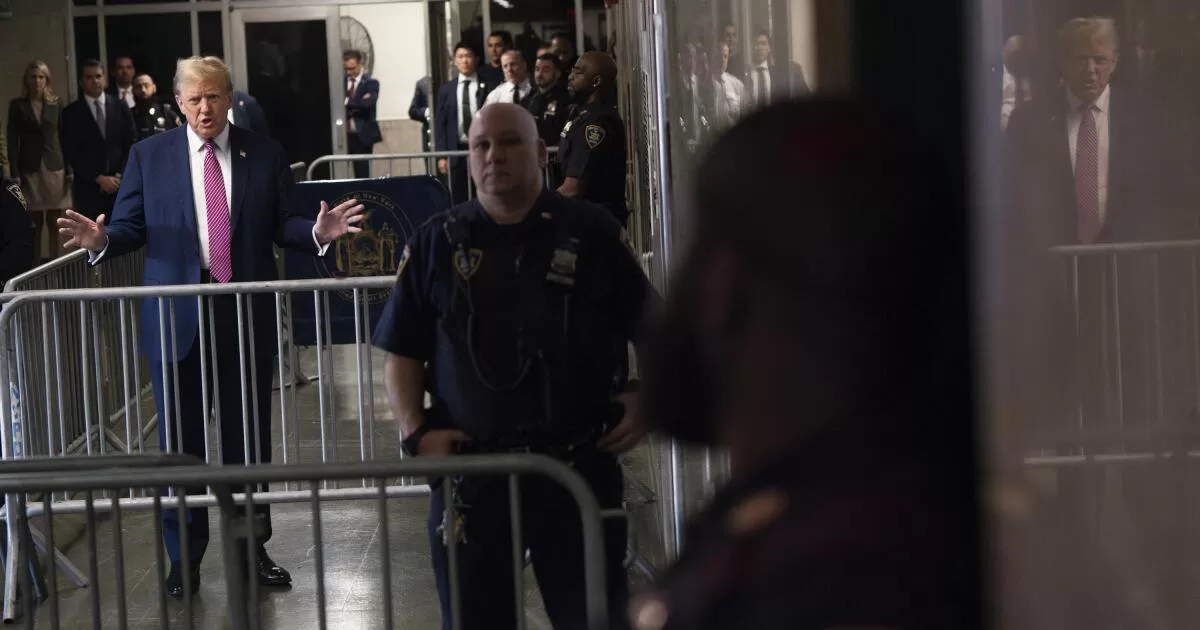After a jury of 12 New Yorkers was seated Thursday, lawyers turned their attention to picking alternates who can vow to impartially judge the presumptive Republican presidential nominee. Thursday’s proceedings demonstrated the unpredictability of the jury selection process in such a high-profile case, with two jurors who had been seated a day earlier being dismissed from the panel.
The judge has suggested that opening statements could begin as early as Monday, before prosecutors begin laying out their case alleging a scheme to cover up negative stories that Trump feared would hurt his 2016 presidential campaign.
The trial will place Trump in a Manhattan courtroom for weeks, forcing him to juggle his dual role as criminal defendant and political candidate against the backdrop of his hotly contested race against President Biden. It will feature salacious and unflattering testimony that his opponent will no doubt seize on to try to paint Trump as unfit to return as commander in chief.
Trump says he did nothing wrong and has cast himself as the victim of what he claims is a politically motivated justice system bent on keeping him out of the White House.
The judge and lawyers have spent days quizzing New Yorkers about their views on Trump, and dozens have been dismissed after saying they couldn’t be fair. Those chosen to hear the case so far include a sales professional, a software engineer, a security engineer, an English teacher, a speech therapist, multiple lawyers, an investment banker and a retired wealth manager.
As more potential jurors were questioned Friday, Trump appeared to lean over at the defense table, scribbling on some papers and exchanging notes with one of his lawyers.
He occasionally perked up and gazed at the jury box, including when one would-be juror said he had volunteered in a “get out the vote” effort for Hillary Clinton’s campaign.
One potential juror was let go after reflecting and saying that she didn’t believe she could be impartial. Another person told the judge she had no strong feelings about Trump and didn’t believe anything would influence her decision in the case.
After arriving at the courthouse Friday, Trump complained about the gag order imposed by the judge that limits what he can publicly say about witnesses. He has lashed out on social media about the judge, prosecutors and likely witnesses, prompting the district attorney’s office to seek sanctions for possible gag order violations. The judge will hold a hearing next week on prosecutors’ request to hold Trump in contempt.
“The gag order has to come off. People are allowed to speak about me, and I have a gag order,” Trump said.
Judge Juan M. Merchan is also expected to hold a hearing Friday to consider a request from prosecutors to bring up Trump’s prior legal entanglements if he takes the stand in the hush money case. Manhattan prosecutors have said they want to question Trump about his recent civil fraud trial that resulted in a $454-million judgment after a judge found Trump had lied about his wealth for years. He is appealing that verdict.
The trial centers on a $130,000 payment that Michael Cohen, Trump’s former lawyer and personal fixer, made to adult film actor Stormy Daniels to prevent her claims of a sexual encounter with Trump from becoming public in the final days of the 2016 race.
Prosecutors say Trump obscured the true nature of the payments in internal records when his company reimbursed Cohen, who pleaded guilty to federal charges in 2018 and is expected to be a star witness for the prosecution.
Trump has denied having a sexual encounter with Daniels, and his lawyers argue that the payments to Cohen were legitimate legal expenses.
Trump faces 34 felony counts of falsifying business records. He could get up to four years in prison if convicted, though it’s not clear that the judge would opt to put him behind bars. Trump would almost certainly appeal any conviction.
Trump is involved in four criminal cases, but it’s not clear that any others will reach trial before the November election. Appeals and legal wrangling have caused delays in the other three cases charging Trump with plotting to overturn the 2020 election results and with illegally hoarding classified documents.
Associated Press writers Peltz, Sisak and Offenhartz reported from New York, Richer from Washington.
